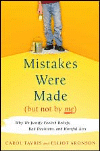| Another
Review at MyShelf.Com | ||||||||||||||
|
The concepts behind this deeply fascinating book are almost scary to absorb, especially given the fact that many of us are conditioned to believe in what we believe in, as contradictory as that sounds! In other words, we assimilate a set of beliefs and carry them throughout our lives. This applies to our childhood memories, our political belief systems, and to most of the established, accepted social and cognitive rules and mores. Looking at both sides of an issue is not the normal mode for most of us. Our upbringing, our place in society, and our personal viewpoints color all of our patterns of thinking. Our dislike of being seen as wrong has become so prevalent, from George Bush downwards, that we sometimes go out of our way to cling to a belief system, or a point of view that has been proven wrong! We have all been in situations where we are discussing, or arguing, a topic, and our opposite is so insistent that their point of view is the right one that they make it clear that inclusion in their circle is dependent on your total agreement with their perspective. The justification continues, even when evidence is presented that debunks the myths on which they base their position! How can we get ourselves away from this self-defeating and dangerous behavior? This book helps us through the morass. Each chapter takes a specific orientation and explains it to the non-scientific mind. For example, Chapter One does a very credible job of defining self-justification, and an unpleasant feeling that Leon Festinger, a social psychologist, called “cognitive dissonance”—characterized as a “state of tension that occurs whenever a person holds two cognitions (ideas, attitudes, beliefs, opinions) that are psychologically inconsistent.” It gives us a basis for understanding and appreciating the rest of the book's perspectives. You will never be able to be so caviler about your opinions, or the attitudes of others, once you internalize the message of this book. It will force you to take a long hard look at your own ideas and willingness to absorb new cognitive content. It is frightening to allow ourselves to explore outside the boundaries of established patterns of thought and deed, and to take ourselves out of the comfort zone of linear thinking. But we will never advance personally, nor as humankind, until we understand the constructs Tavris and Aronson so ably teach us. The endnotes were equally interesting, giving us a view of Tavris and Aronson's reading, which got them to the point of writing the book. Each chapter has backup reading provided, and resources for exploring more of the engrossing study of social psychology and how our minds work. The entire book is great for the layman, easily understood without preaching down to the reader. There is a lot to learn, but the end result will make us much more functional as human beings, and much more capable of understanding our creative and ideological differences. |
|
|||||||||||||
©
2006 MyShelf.com |
||||||||||||||
 Mistakes Were Made (but not by me )
Mistakes Were Made (but not by me )